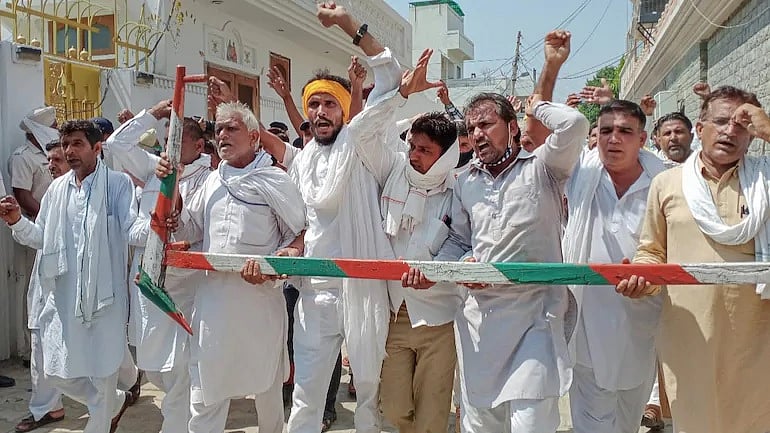Punjab is at the fulcrum of protests against the Farm Act 2020, which terminates the monopoly enjoyed by government-run mandis in the foodgrain trade. The new law does not affect farmers per se, but creating an outcry enables the agricultural state to divert attention from its own calamitous financial plight and puts the Centre on the defensive instead.
Consider the main objection to privately-run mandis, voiced by activists like social scientist-turned-politician Yogendra Yadav. They point out that no taxes, cesses or commissions will be levied at these mandis, thereby making them more attractive to private traders than the highly taxed government-run (APMC or Agricultural Produce Marketing Committee) mandis. Eventually, they speculate, the government-run mandis will dry up and close down, throwing the farmer to the mercy of rapacious private traders.
How does this affect farmers in the context of Punjab? It doesn't. The fact is that the trade in cereals is almost exclusively the domain of the public sector and private traders are marginalised. For instance, in 2019, private purchases stood at 60,000 tonnes of wheat or 0.4 per cent of the arrivals. The rest – 99.6 per cent - was bought by public sector entities. All the new law does is to create a little more space for private traders.
Yadav & Co's argument is actually a point in favour of the Farm Act. Why must private traders, or even the Food Corporation of India (FCI), purchase from APMC mandis, where arhatiyas earn a government-mandated 2.5 per cent commission for barely any services rendered? In 2019, Punjab levied 8.5 per cent taxes/cesses/commissions on purchases in its mandis, the highest rate in the country.
Nor has the Punjab government implemented the simple pro-farmer measure of making direct payments to farmers for produce procured by state agencies, rather than routing it through the arhatiyas. The latter have been vociferous in their opposition to direct payments to farmers, despite an assurance from the state government that it would continue to pay their 2.5 per cent commission.
Obviously, direct payments would erode the arhatiyas' power over farmers and expose their role as a channel of informal credit.
Punjab Finance Minister Manpreet Singh Badal underlined the state's main concern when he said it would lose Rs 4,000 crore in revenues from the mandis. In 2019, Punjab earned a total of Rs 3,642 crore by levying a market fee and a rural development fund (RDF) cess, totalling six per cent. (The objective of the RDF is ostensibly to maintain the rural road network.) As said earlier, it is hardly likely that private mandis will emerge overnight, so the state government's losses will be marginal.
In any event, farmers are not affected. They will weigh the advantages - in terms of price, transportation costs, dealing with arhatiyas, etc. - of selling at an APMC mandi rather than at the farm gate or in a private mandi and opt for whatever offers the best returns and the least headaches.
Manpreet Badal, arguably a smart finance minister, has merely parroted Chief Minister Capt Amarinder Singh's claim that the new law undermines federalism and raises the bogey of the entire MSP system being discontinued – which the Centre has repeatedly and emphatically denied. MSP-based procurement will continue.
Whatever losses the state suffers on account of mandi fees must be seen in the light of Punjab's real problem: the Rs 16,400 crore power subsidy bill. The bulk of this subsidy – more than 70 per cent – is on account of agriculture. It must be noted that Manpreet Badal was sacked from the Punjab Cabinet in 2007 by his uncle Prakash Singh Badal, the then chief minister, for having dared to suggest that power subsidies to the farm sector be curtailed, in return for waiving half of the state's massive debt. (By the time Manpreet Badal returned as finance minister under Capt Amarinder Singh, that debt had ballooned sixfold.) Nor is the state willing to pay the power subsidy directly to the farmer, a move that would check leakages and bring down the total bill, for fear that farmers will object to metered connections.
Change is painful but inevitable, a fact that Punjab will have to accept. Rather than protesting the Farm Act, 2020, its energies should be directed towards rationalising power subsidies, improving credit delivery to farmers, making mandis more conducive to private traders, leveraging e-NAM for better price discovery, introducing eco-friendly technologies and making a big push towards crop diversification. Not to mention tackling its staggering debt of Rs 2.29 lakh crore.
The writer is a senior journalist with 35 years of experience in working with major newspapers and magazines. She is now an independent writer and author.









